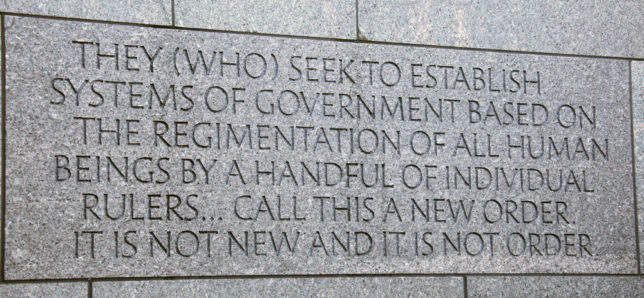Organization Trends
SPLC and the Left’s Growing Philanthropic Tyranny


Every day across the country, Americans live and work in a world bound by social networks that imbue society with the norms, trust, and reciprocity necessary for voluntary communal cooperation. Political scientists and sociologists often theorize about this “social capital,” which refers to value generated by human relationships. While we often associate tangible forms of wealth—i.e., money and assets—with the term “capital,” equally important to Americans’ overall quality of life is the value inherent in human connection and the building of social networks.
In the world of American philanthropy liberals and conservatives jockey over a pervasive divide in social capital. This divide looks like distinctly separate visions of what is in the public’s best interest. Philanthropic institutions, more than other private entities, rely on social capital because it provides the voluntary social networks necessary to further non-profit activities. At the center of the social capital divide are left-leaning philanthropic institutions that move in lockstep with the political Left to gain the upper hand. They leverage the power of human social networks to interfere with the charitable marketplace by shaming and silencing opposing perspectives.
Interferences from Left Field
Central to philanthropy are the networks of private individuals that voluntarily spearhead social change. These associations shape society’s perspective on pivotal issues by both defining and solving problems they deem the most pressing. With this in mind, the “Hate is Not Charitable” campaign led by left-wing watchdog Southern Poverty Law Center (SPLC) and the Amalgamated Foundation—an off-shoot of the labor-union-controlled Amalgamated Bank of New York—should raise concerns amongst donors and the public about the power of certain groups to reshape public trust and disrupt avenues of market reciprocity.
In March, the Amalgamated Foundation joined the SPLC to influence American philanthropy. Amalgamated used the SPLC’s widely discredited “hate map” as a litmus test in an attempt to shame nonprofits that host donor-advised funds (DAFs) and “persuade” them to cease facilitating private donations to these groups.
Since the campaign’s launch, the network of wealthy foundations and donor advised fund providers quietly expanded from an initiative with 20 partner organizations to a campaign of almost 80 and still growing. At the start of the campaign, the organizations influenced about $1 billion in total assets. As of the summer of 2019, the figure grew to over $3 billion.
Civic-minded donors ought to take note: outside its own organization, the SPLC has a disproportionate amount of influence, despite a poor record.
Critics note the SPLC fails to distinguish right-of center figures like U.S. Senator Rand Paul (R-KY) and U.S. Secretary of Housing and Urban Development Ben Carson from actual Neo-Nazis and white supremacists. Moreover, in 2012, political terrorist Floyd Lee Corkins sourced the “Hate Map” before attempting murder at the Washington, D.C., headquarters of the conservative Family Research Council (FRC). This situation alone should demonstrate the deadly consequences that can arise from mislabeling mainstream conservatives as extremists. Earlier this year, the SPLC fired co-founder Morris Dees over allegations of sexual misconduct and racial discrimination.
What’s remarkable about the SPLC is that it still maintains its social capital after so much scandal. Scholars of social capital theory refer to a “symbolic” marketplace where groups espousing different worldviews seek to define what is “good,” “moral,” and “right” for the rest of society. The SPLC imposes its orthodoxy and “normalizes” it in such a way that the SPLC and its acolytes disrupt free-flowing market debate. This orthodoxy makes all opposing actions and ways of thinking seem objectively “wrong.” The 19th century French political philosopher Alexis de Tocqueville warned that a peculiar form of tyranny would come to America if “a network of small, complicated, minute, and uniform rules” normalized a tyrannical worldview unbeknownst to the majority in society.
The SPLC tries to disguise its political bent as moral objectivity and this marketplace interference prevents individuals from clearly distinguishing between good and bad nonprofits. Behind a virtuous façade, a trail of grants and expenditures left by members of the “Hate is Not Charitable” campaign demonstrate how these nonprofits choose to enforce this orthodoxy.
Close examination of some of the campaign’s partner organizations shows how “charitable” these entities are in practice.
Between 2006 and 2017, the left-wing Proteus Fund doled out over $100 million in grants to groups that push for illiberal campaign finance policies, reductions in religious freedom, and “social justice” causes. Proteus isn’t alone in its peculiar grantmaking. The activist nonprofit, National Immigration Law Center (NILC), publicly condemned the Trump Administration’s immigration policy and called on American CEOs to discriminate against potential employees who supported the policy. NILC is worth over $7 million in total assets and donates to the Center for Community Change (CCC) that promotes the interests of illegal immigrants and seeks a $15 minimum wage hike. These are just two groups out of the many groups involved in the campaign.
A Growing Philanthropic Tyranny
Conservatives often look to philanthropy as the preferred alternative to big government intervention in pressing social issues. Donor-advised funds are popular among middle-class philanthropists and small-dollar donors because they offer a less-expensive way to maintain financial control of their philanthropic dollars. However, DAFs rely on trust between donors and the professionals who manage the funds. The “Hate is Not Charitable” campaign throws a monkey wrench into this model, by encouraging DAF providers like Fidelity, Vanguard, and Schwab Charitable to ignore a donor’s intent and refuse to make donations to “unapproved” nonprofit groups.
The “Hate is Not Charitable” campaign subverts donor intent by disguising a leftist agenda as a purely moral initiative to rid the philanthropic world of “hate.”
As long as groups like the SPLC continue to wield moral authority and enjoy favorable treatment from the academy and legacy media outlets, conservatives will be marginalized. It is up to active philanthropists and the public to question the liberal agenda and not take labels of “hate” at face value.



